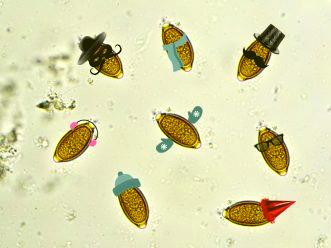
We’re here to bust some common myths about parasites and parasite prevention.
One of the main risk of parasites is the zoonotic transmission that may happen to your family. Children and immune-compromised family members are at the biggest risk. Please discuss your questions about prevention and treatment with one of our friendly staff. Annual testing ensures early and timely detection of a positive case.
“My pet’s stool is normal (no diarrhea) – they must not have any parasites” – False
Diarrhea is not the only symptom of an internal parasite prevention! Often they will have normal stool production until the infestation is at a critical level. More common symptoms to be observant of is pale mucous membranes, failure to gain weight, dehydration, poor hair coat, coughing and that pot-bellied appearance.
Please remember most infections are asymptomatic (no signs).
I don’t see any “worms” in the stool – they don’t have any worms. – False
Parasite’s live in the intestine, they are happy there and do not want to leave. The eggs they produce are what is passed in stool, these are microscopic! The only way you will see a parasitic infection is in tapeworm infections if severe/rare cases you may see little rice like bits moving in the stool. Also roundworm infections as patients often vomit large masses of worms that look like spaghetti. Gross right? Instead of letting your pet get to an overload of parasites before noticing/treating we recommended monthly preventive for everyone’s health.
They are on a monthly dewormer – do I still need to test? – Yes
Yes! The de-wormer we recommended at Bow Bottom is broad spectrum and generally covers most parasites. However there is concern that some worms are becoming super worms – therefore we still recommend testing annually. Also there are common parasites like giardia, coccidia and the new major concern is Echinococcus that are not covered under the deworming normally prescribed. Giardia is most common in puppies and coccidia in kittens.
My puppy was dewormed by the breeder – that is sufficient. – No
Sadly no, breeders often deworm with an over the counter medicine which is considered not adequate. Of course each breeder is different and we recommend bringing your puppy in for its first puppy visit as soon as possible, that way we can sign your pet up for insurance and discuss a proper vaccine schedule and deworming plan. Please bring any records your breeder has given you for us to place in your file.
My cat is always indoor – no need for parasite prevention – False
Yes! Your cat although indoors is still at risk. We leave the house daily and may walk around higher risk areas like farms, parks or other outdoor places and track in parasite eggs on our shoes. Also if you have an indoor cat but a dog as well, they can share parasites between species so highly recommended to keep your indoor kitty up to date on parasite prevention and vaccines!
Flea and parasite prevention is toxic for my pet. The pet store products are the same– False!
Veterinary products are by prescription as it is important to ensure your pet’s health before administering any medications. There are possible reactions to any medication and if you have concerns, please discuss with one of our technicians or with Dr. Schell. Pet store products are very risky as they are more based off pesticides and you are more at risk of selecting the wrong dose, they can be very toxic to cats if the wrong medication is given. It has been demonstrated that pet store products only affect approx. 50% of fleas due to resistance and lack of residual effect.
Ticks, Are those parasites too? – Yes
Yes. Ticks transmit a large variety of disease agents that can cause Lyme disease and many other harmful diseases. Ticks are very small and often overlooked therefore prevention is the best method of protection and not just removal.
Heartworm? Not here in Canada – False
Yes. Heartworm occurs in warmer regions, where summer temperatures are high enough for the worm larvae to survive inside the carrier mosquitoes. The high-risk areas in Canada are southern Ontario, southern Quebec Manitoba, and the Okanagan in British Columbia. Heartworm is also found in most states in the US. Although it is not absolutely certain, it appears that heartworms are unable to survive at prevailing temperatures in Alberta and Saskatchewan. A few cases are diagnosed in these provinces every year, but to date the dogs have visited or lived in heartworm risk areas. We recommend heartworm prevention as many of our patients travel and it is one less concern on the pre-packing list.
_____________________________________________________________________________________________
Did you know?!
Biggest areas of infection: Dog parks, farms/barns, daycare centers, puppies from mothers and exploring the environment, fleas, anywhere wild life is, even your own backyard!
A female roundworm can lay up to 85,000 eggs per day! These hard shelled eggs can survive in the environment for years. A whipworm female only produces about 2,000 eggs a day but they can still live for multiple years in the environment.
Hookworms have a very short growth period, even pets on a monthly dewormer may have adult worms in their intestines. This stresses the importance of minimally yearly stool testing.
In puppies under 6 months studies have shown as many as 30% are infected with roundworm.
Just one flea can become 1,000 on your pet and in your home in only 21 days.
_________________________________________________________________________________________
Preventive measures
At least yearly stool testing at your annual exam.
Monthly parasite prevention with a broad spectrum medication.
Feeding a commercial or home cooked diet, raw diets are not recommended.
Limit access to areas where wildlife are (Stay on leash in parks, on hikes)
Do not let cats outside unsupervised, most cats take to a harness and leash walking very well or build a catio!
Do not handle animal feces or urine with bare hands.
Promptly and regularly clean your yard with proper stool disposal
Reduce tick habitat, such as leaf litter or long grasses in your yard.
We have teamed up with our Veterinary Reference Lab to help research parasites in our area, and to make sure our fur friends are parasite free!
For the next 4 weeks (ending November 30th at 12pm!) we are offering Annual Parasite Screens at no cost! (** Conditions apply, see below) The screen includes the routine fecal centrifuge (looking for pesky parasites and eggs), as well as a giardia test, and the brand new antigen screening looking for hookworms, roundworms, and whipworms. This entire screen is normally in the realm of $100, but our charge to you is $0! All we ask is that you make a donation to Tails of Help.
Why Tails of Help?
Tails of Help recently reached out to all clinics in Alberta with a sad message:
“……. Tails of Help is now on the verge of having allocated all our available charitable funds for providing pet treatment aid. Effective immediately, as of September 11, 2019, Tails of Help will have to temporarily suspend accepting applications to aid pet owners in need.”
Click HERE to learn more about Tails of Help!
We wanted to help, and thought we would use this parasite data collection as an opportunity to collect some donations for Tails of Help. We have nominated our clients and patients for this charity and they have used them to help their pets. We are hoping to help them replenish some of the bank and aid more pets in need.
Please call our team if you have any questions! Samples can be brought in during office hours.
** For research purposes the free testing is on “Healthy screens”, the No charge test cannot be completed on diarrhea or loose stool


